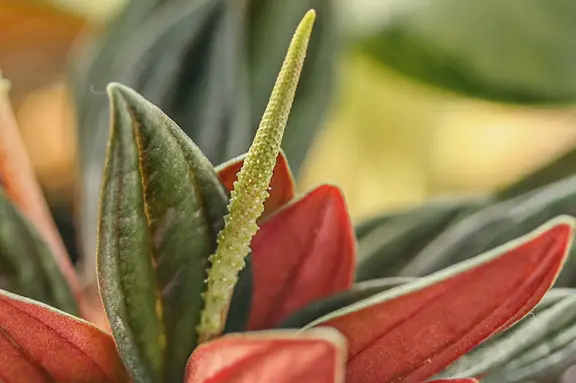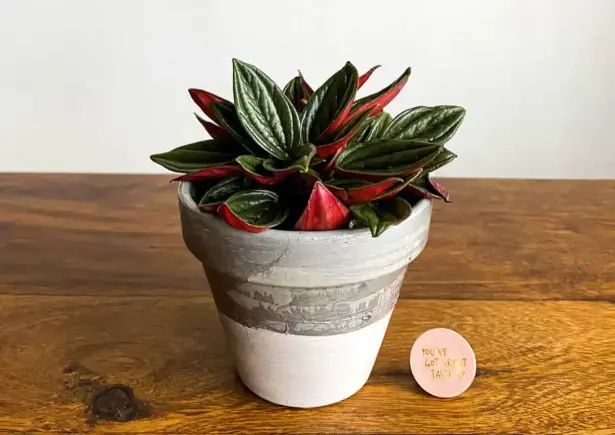Introduction
Peperomia Rosso (Peperomia caperata ‘Rosso’) is a compact houseplant known for its deep green quilted leaves with striking red undersides. Native to South America, it belongs to the Piperaceae family, which includes over 1,500 species of peperomias. With its manageable size, vibrant foliage, and relatively easy care requirements, Rosso is a favorite among indoor plant collectors.
In this guide, we’ll explore how to grow, maintain, and keep your Peperomia Rosso healthy year-round.
Appearance and Growth Habits
- Size: Typically grows up to 8 inches (20 cm) tall and wide.
- Leaves: Thick, textured, dark green tops with vibrant red to burgundy undersides.
- Flowers: Produces small, rat-tail-like spikes that are ornamental but not showy.
- Habit: Rosette-forming, compact, ideal for tabletops and shelves.

Ideal Growing Conditions
1. Light Requirements
- Prefers bright, indirect light.
- Avoid direct midday sun, which can scorch leaves.
- Can tolerate medium light, but colors will be more vibrant with sufficient brightness.
- Artificial grow lights work well in darker homes.
Tip: Place near an east- or north-facing window, or a few feet away from a south/west-facing one with sheer curtains.
2. Temperature
- Thrives between 65–80°F (18–27°C).
- Avoid cold drafts and sudden temperature drops below 55°F (13°C).
3. Humidity
- Prefers medium humidity (40–60%).
- Tolerates normal household humidity, but growth is better with slightly higher moisture in the air.
- Use a humidity tray or small humidifier in dry climates.
Watering and Soil
Watering
- Allow the top 1–2 inches (2.5–5 cm) of soil to dry out before watering again.
- Peperomia Rosso stores water in its thick leaves—similar to succulents—so overwatering is the most common cause of problems.
- Use the “soak and dry” method: water thoroughly, then let excess drain away.
Soil
- Requires a well-draining soil mix.
- Ideal mix: 2 parts peat-free potting soil, 1 part perlite, 1 part orchid bark.
- A succulent or cactus mix amended with coco coir works well.
Fertilizing
- Feed monthly during the growing season (spring to early fall) with a balanced liquid houseplant fertilizer diluted to half strength.
- Reduce feeding in winter when growth slows.
- Too much fertilizer can burn the roots—less is more.
Potting and Repotting
- Choose a small pot with drainage holes—Peperomia Rosso likes being slightly root-bound.
- Repot every 2–3 years or when roots start circling the pot.
- Refresh soil during repotting to maintain aeration and nutrition.
Propagation Methods
Leaf Cuttings
- Select a healthy leaf with a petiole.
- Cut and place in water or directly into moist soil.
- Roots will form in 3–6 weeks.
Division
- Gently remove the plant from its pot.
- Separate clumps of leaves and roots.
- Replant into smaller pots.
Both methods are relatively easy and provide new plants for friends or home expansion.
Common Problems and Solutions
| Problem | Cause | Solution |
|---|---|---|
| Yellowing leaves | Overwatering, poor drainage | Let soil dry, repot in fresh mix |
| Drooping leaves | Underwatering or cold drafts | Check soil moisture, move to warmer spot |
| Brown leaf tips | Low humidity, fluoride in water | Increase humidity, use filtered water |
| Pests (mealybugs, spider mites) | Dry air, weak plant health | Wipe leaves, apply insecticidal soap |
Toxicity and Safety
Peperomia Rosso is non-toxic to pets and humans (ASPCA certified). This makes it a safe choice for households with cats, dogs, or young children.
Decorative Uses
- Perfect for tabletops, desks, and shelves due to its compact size.
- Works well in mixed displays with succulents and other peperomias.
- Excellent in terrariums or small pots for minimalist indoor décor.
Seasonal Care Tips
- Spring/Summer: Regular watering, monthly fertilization, possible repotting.
- Fall/Winter: Reduce watering and feeding; maintain stable indoor temperatures.
Conclusion
Peperomia Rosso is a low-maintenance, colorful houseplant that fits perfectly into modern homes and offices. With its striking green-and-red leaves and compact growth, it’s both decorative and easy to manage. By providing bright, indirect light, moderate watering, and well-draining soil, your Peperomia Rosso will thrive for years.
Whether you’re a beginner or an experienced plant collector, this little gem deserves a place in your indoor garden.
📌 Quick Care Summary
- Light: Bright, indirect
- Water: Let topsoil dry before watering
- Soil: Well-draining mix
- Temperature: 65–80°F (18–27°C)
- Humidity: Medium, 40–60%
- Fertilizer: Monthly, spring to fall
References
- McMahon, M. J., Kofranek, A. M., & Rubatzky, V. E. (2007). Hartmann’s Plant Science: Growth, Development, and Utilization of Cultivated Plants (4th ed.). Pearson Prentice Hall.
- Armitage, A. M. (2008). Herbaceous Perennial Plants: A Treatise on Their Identification, Culture, and Garden Attributes (3rd ed.). Stipes Publishing.
- National Gardening Association. (n.d.). Peperomia caperata. Retrieved from https://garden.org/plants/view/123071/Peperomia-caperata-Rosso/

